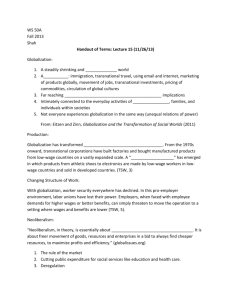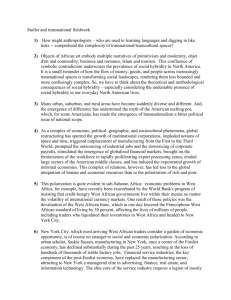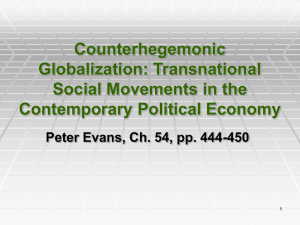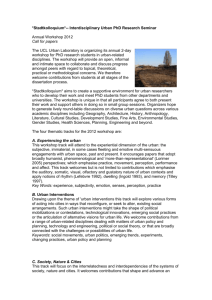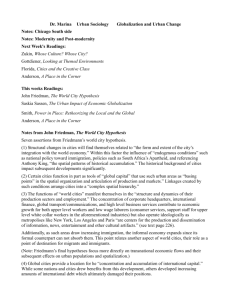Religious Pluralism Beyond the Nation
advertisement
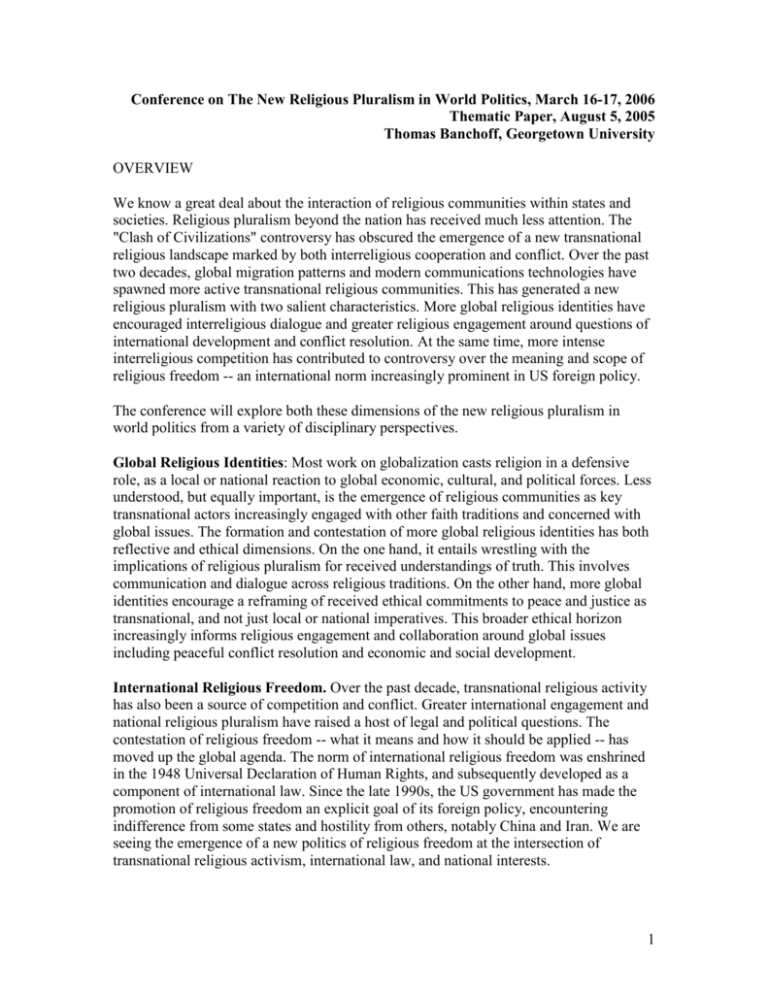
Conference on The New Religious Pluralism in World Politics, March 16-17, 2006 Thematic Paper, August 5, 2005 Thomas Banchoff, Georgetown University OVERVIEW We know a great deal about the interaction of religious communities within states and societies. Religious pluralism beyond the nation has received much less attention. The "Clash of Civilizations" controversy has obscured the emergence of a new transnational religious landscape marked by both interreligious cooperation and conflict. Over the past two decades, global migration patterns and modern communications technologies have spawned more active transnational religious communities. This has generated a new religious pluralism with two salient characteristics. More global religious identities have encouraged interreligious dialogue and greater religious engagement around questions of international development and conflict resolution. At the same time, more intense interreligious competition has contributed to controversy over the meaning and scope of religious freedom -- an international norm increasingly prominent in US foreign policy. The conference will explore both these dimensions of the new religious pluralism in world politics from a variety of disciplinary perspectives. Global Religious Identities: Most work on globalization casts religion in a defensive role, as a local or national reaction to global economic, cultural, and political forces. Less understood, but equally important, is the emergence of religious communities as key transnational actors increasingly engaged with other faith traditions and concerned with global issues. The formation and contestation of more global religious identities has both reflective and ethical dimensions. On the one hand, it entails wrestling with the implications of religious pluralism for received understandings of truth. This involves communication and dialogue across religious traditions. On the other hand, more global identities encourage a reframing of received ethical commitments to peace and justice as transnational, and not just local or national imperatives. This broader ethical horizon increasingly informs religious engagement and collaboration around global issues including peaceful conflict resolution and economic and social development. International Religious Freedom. Over the past decade, transnational religious activity has also been a source of competition and conflict. Greater international engagement and national religious pluralism have raised a host of legal and political questions. The contestation of religious freedom -- what it means and how it should be applied -- has moved up the global agenda. The norm of international religious freedom was enshrined in the 1948 Universal Declaration of Human Rights, and subsequently developed as a component of international law. Since the late 1990s, the US government has made the promotion of religious freedom an explicit goal of its foreign policy, encountering indifference from some states and hostility from others, notably China and Iran. We are seeing the emergence of a new politics of religious freedom at the intersection of transnational religious activism, international law, and national interests. 1 Conference on The New Religious Pluralism in World Politics, March 16-17, 2006 Thematic Paper, July 5, 2005 Thomas Banchoff, Georgetown University GLOBAL RELIGIOUS IDENTITIES Work on culture and globalization tends to focus on dynamics of reaction or resistance. Religion figures as a defensive response to economic and cultural globalization, a way to assert local identities against the international. Global forces drive an individualization of religious belief and a reconstitution of local and national religious communities that often incorporate old and new hybrid elements. A religious pluralization takes place. The conference will highlight another dimension of religion and globalization -- the reconstitution of religious communities as transnational actors. Over the past two decades, greater migration flows and revolutions in communications technology have driven the rearticulation of more global religious identities. In the case of Islam, for example, Satellite TV, the Internet, and the post 9/11 international context have reinforced the idea of the umma, a transnational Muslim community. All three Abrahamic faiths have always had global identities anchored in faith in one God and universal truth claims. But globalization is driving them -- and other leading traditions, including Hinduism and Buddhism -- to rethink their world-roles in two new ways. Religious identities. Religious communities are increasingly grappling with the existence of other traditions and the implications of religious pluralism for their own selfunderstanding. This engagement takes place both on the level of everyday lived religion and in more specialized theological reflection. As they come engage one another in local, national, and transnational settings, religious communities increasingly find a place for members of other traditions in their own narratives. At the same time, theological reflection grows out of an engagement with other traditions in formal dialogue. Both of these responses involve not a repudiation of received beliefs, but rather their reformulation in the context of a plurality of faiths. The process of engaging a plural reality, not any definite outcome, drives the emergence of more global religious identities Ethical commitments. The increasing globalization of economic and political life has cast established religious moral traditions in a new light. Preferences for non-violent conflict resolution and alleviation of the plight of the poor – broad commitments across the major world religions – have gained new salience and urgency within an emergent (if still fragmented) global public sphere. This more global identity has driven collaboration across religious groups in support of economic and social development as well as interfaith efforts to address violent regional conflicts. This more global engagement is marked by new forms of cooperation with states and international organizations. Conference participants are invited to address the construction and contestation of global identities within and across religious communities in both their reflective and ethical dimensions. They may also address how the emergence of religious communities as transnational actors shapes our understanding of globalization as a whole. 2 Conference on The New Religious Pluralism in World Politics, March 16-17, 2006 Thematic Paper, July 5, 2005 Thomas Banchoff, Georgetown University INTERNATIONAL RELIGIOUS FREEDOM The new religious pluralism in world politics also has a competitive dimension. As they interact with one another and -- through new communications technologies -- project their identity more globally, religious communities contend for some of the same adherents. There is nothing like a global religious "market." Religion is not a commodity and conversions are relatively rare. Moreover, some faith traditions forswear missionary activities altogether. Nevertheless, all religious communities seek to at least maintain -- if not increase -- their numbers and preserve core collective identities against erosion. The universal drive to survive and thrive creates a competitive transnational religious sphere framed by both international norms and national policies. International norms. International norms of freedom of religion, broadly shared across societies and institutionalized in international law, frame transnational religious competition. The major world religions all generally assert that faith is a matter of free choice, albeit in different idioms and with different degrees of emphasis. International law and the UN system institutionalize the same principle. Article 18 of the 1948 Universal Declaration of Human Rights underscores the freedom of individuals to "change religion or belief." In a similar, if somewhat weaker vein, the 1966 International Covenant on Civil and Political Rights establishes the freedom to "have and adopt" religion or belief. In 1981 the UN approved a more formal legal instrument, the Convention on the Elimination of Religious Discrimination and Tolerance. Since 1986 the UN Commission on Human Rights has sought to monitor infringements on religious liberty and discrimination on the basis of religious affiliation. National policies. International consensus about the value of religious freedom coexists alongside a range of national policies more or less supportive in practice. There is no level playing field for transnational religious competition. States provide national legal frameworks ranging from theocracy through state-sponsored subsidies and strict churchstate separation that favor some groups over others. Since the 1990s the politics of religious freedom has taken on an increasingly salient transnational dimension. In 1998 the US Congress passed and President Bill Clinton signed into law a bill mandating an important role for international religious freedom in US foreign policy, including comprehensive annual reports on violations worldwide. For some observers, subsequent US condemnations of China, Iran, and other countries is a welcome reassertion of established international norms. For others the policy is a concerted effort to export Christianity and interfere in the domestic affairs of other states. Conference participants are invited to examine the evolution of international norms of religious freedom or to explore its role in US foreign policy in particular. They may also address the impact of controversy surrounding religious freedom on our understanding of religious pluralism in world politics more broadly. 3


